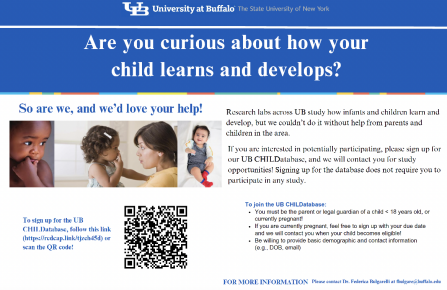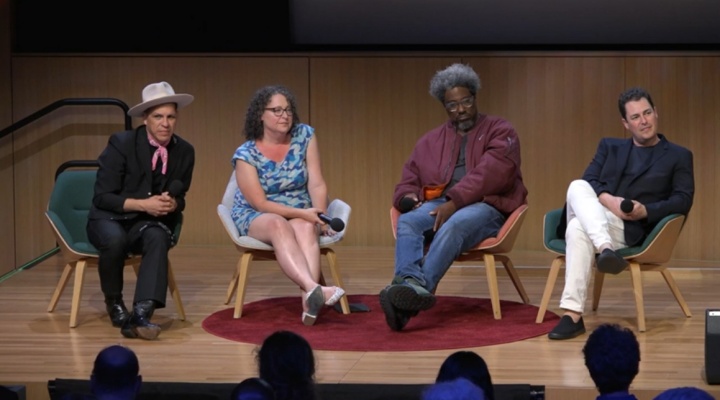
Shira Gabriel (second from the left) was featured at a live recording of the "SongWriter" podcast in KQED studios in San Francisco. Read more.
In this Issue:
Support your Department
Dear UB Psychology Friends,
It’s been a beautiful – and unusually warm fall in Western New York, and the end of the semester seems to be following especially quickly on the heels of summer! As we wind down 2024, we are delighted to share some of the Department’s past successes and future hopes.
This has been a year of incredible growth for our department, and we’re looking forward to even more growth in the coming year! This year we welcomed Drs. Rebecca Cipollina and Kim Chaney to our department. These hires are part of a Disciplinary Excellence investment in the Psychology Department by UB’s Provost, and part of a broader effort to expand faculty expertise in the area of inclusion and equity. Dr. Cipollina’s research focuses on prejudice and how prejudice may impact wellness and functioning among those in marginalized groups. Dr. Chaney’s work focuses on stigma, belonging, and mental health outcomes in individuals with stigmatized identities.
In the classroom, through experiential learning opportunities such as working in research labs, and through involvement in clubs, activities, and independent Honors projects, our more than 1500 undergraduate Psychology majors are gaining important experience in the field. UB’s “Model Chapter” of the International Psychology Honors Society, Psi Chi, is another of the many ways that our undergraduates get and stay connected with the field. This year, Psi Chi was once again named a “Model Chapter” for the fourth year in a row! Activities for this group included a game night and Western NY’s only undergraduate psychology research conference, organized by our own Dr. Joyce Lacy. This year, the conference drew more than 150 attendees from around Western New York. In January of this year, we expanded our undergraduate teaching faculty with another addition, Dr. Christina Perazio. Dr. Perazio brings expertise in animal behavior, and she is teaching courses in animal behavior and animal cognition to expand our coverage on these topics.
Our department’s Masters and Doctoral are crucial to the Department’s mission, and we are honored to mentor them, and support their professional development. These graduate students are active in research in faculty labs, publishing papers, presenting at conferences, and winning awards. Please read more in this newsletter about some of our graduate students’ outstanding achievements this past year.
Also in this newsletter is more about Psychology Department’s participation in UB’s VITAL scholar program. This program brings early career faculty from historically underrepresented backgrounds to UB’s campus to share their research and to forge connections for the future. In October, the Psychology Department was selected to host three scholars, who visited us for nearly a week, meeting with faculty, touring the city, and discussing research and career plans. The program was once again a success and allowed us to continue to build new relationships with diverse scholars from around the country.
I hope that you enjoy reading more about our department’s activities and our plans for 2025. I thank you for your past generous donations. Your support allows us to expand and move forward in new and meaningful ways. We are grateful for the opportunity to build our department with your help.
In closing, I wish you a very happy and healthy holiday season. We look forward to connecting with you more in the New Year.
Best,
Jen Read
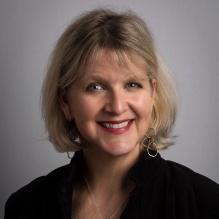
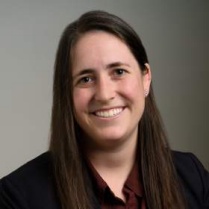
Kim Chaney
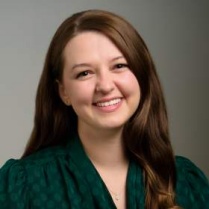
Rebecca Cipollina
Welcoming Two New Assistant Professors!
The department is delighted to welcome two new assistant professors—Dr. Kim Chaney and Dr. Rebecca Cipollina—as part of our commitment to better understanding disparities in psychological well-being across the lifespan.
Dr. Chaney’s research focuses on the beliefs or lay theories people have about prejudice. She is interested in understanding how people think prejudice works and how these understandings or lay theories influence two aspects of social life—when members of marginalized groups anticipate facing discrimination and how people choose to combat prejudice. Grounding her research questions in real world events, her lab examines how social policies (e.g., anti-LGBTQ+ policies in K-12 schools), and organizational actions (e.g., universities making public commitments to diversity, equity, and inclusion) impact belonging for marginalized group members. Her lab also examines what motivates people to confront prejudice and how people respond after being confronted for making a stereotypical or prejudiced statement—that is, do they resist, reduce their biases, or become confronters themselves?
Dr. Cipollina's lab examines how belonging to a socially derogated (i.e., stigmatized group) affects feelings of belonging and the mental health outcomes of people with non-visible and visible stigmatized identities (e.g., LGBTQ+ identity, physical disability). Her lab finds that people with and without stigmatized identities avoid conversations about these identities, sometimes out of fear and discomfort and other times because of beliefs about how we as a society should approach diversity. However, her lab has revealed that promoting rather than avoiding conversations about stigmatized identities and experiences is better for the health and belonging of people who belong to stigmatized groups. The labs ongoing work continues to identify barriers to these conversations while engaging in research identifying the multitude of outcomes associated with avoiding these conversations like coping with alcohol among LGBTQ college students and lower identity pride among people with disabilities.
The department funds an annual Diversity, Equity, and Inclusion (DEI) Grant Program. These grants support undergraduate and graduate students on projects and activities that enhance inclusiveness in the field of psychological science. For the 2023-2024, we funded six students. This included four research projects and assistance to two students to present at academic conferences. If you would like to support this program, we would welcome your donation.
We also hosted 3 VITAL scholars for a week in October 2024. The Visiting Future Faculty (VITAL) program is the Office of Inclusive Excellence initiative. This program was developed to support the career development of young scholars from historically underrepresented backgrounds. While on campus, our visiting scholars participated in academic activities and professional development sessions, received mentorship, and toured UB and the city of Buffalo. They also met with students, faculty, and staff in our department and gave talks on their research. Violet Kimble’s (Yale University) research uses rodent models to examine sex differences in addiction and mental-health-related processes; Faizun Bakth’s (Wayne State University) research examines how adolescents' social relationships, especially peer victimization, shape their identity and well-being; Özlü Aran’s (University of Denver) research examines how early interactions between a mother and child affect the child’s later emotional regulation.
Psychology Faculty out and About
Shira Gabriel was featured at a live recording of the podcast SongWriter in KQED studios in San Francisco (July 10, 2024 7:00 PM, PT). How did this happen? Well, Dr. W. Kamau Bell (stand-up comic and television host) first wrote a story about Dr. Gabriel’s research on collective effervescence. Then, Las Cafereras (a Chicano band from East Los Angeles) wrote a song about Dr. Bell’s story about Dr. Gabriel’s research. Describing this as the “most surreal” experience of her academic career, Dr. Gabriel reports that the story and song were performed live on the podcast with some chatting about identity, home, and collective effervescence. People in the audience submitted their own stories of collective effervescence and Dr Gabriel picked her favorite and awarded the winner a copy of Mr. Bell's book.
Rebecca Ashare, Sarah Taber-Thomas, and Hollen Reischer have been working with the National Witness Project (NWPto develop and test a new mental health outreach program aimed at reducing stigma and increasing access to mental health care for Buffalo’s Black residents. The idea for this project, called Witnessing for Mental Health, grew out of expressed need for mental health care in the community following the May 14th Tops massacre. The outreach program was developed in partnership with and is led by the NWP’s lay health worker team. To date, there has been an overwhelmingly positive response, with nearly twice the number of individuals attending as anticipated. What’s more, approximately 30% of individuals attending the programs requested help accessing services. The need and eagerness for mental health care among Buffalo’s Black residents is evident, and so, the UB/NWP team is seeking funding to support the sustainability and growth of this work.
Lora Park collaborated with an international team on a paper that offers guidelines to the field of psychology for how to start and sustain engaging scientific collaborations.
Resarch Highlights
A friend in need…
The Read lab tested a novel intervention (the PAIRS intervention) that enlists friends as allies to help reduce sexual assault risk among college women. Women who received the PAIRS intervention engaged in more assault-protective behaviors and reported less sexual assault at the 3-month follow. Findings point to the power friends have to protect one another against assault.
Change is good for infant learning…
In everyday conversation, words sound different every time they are said. Can hearing such variability in speech actually help infants say new words? Bulgarelli’s Buffalo Early Learning lab measured properties of words said to infants—including variability in how fast the word is said. They found that infants who heard the same words said both quickly and slowly said those words earlier!
Rodents may smell with sound…
The Mercado lab just published new findings that suggest that rodent vocalizations can contribute to a unique mode of active olfactory sensing. Rodent vocalizations that are inaudible to the human ear seem to help rodents organize different odors in their environment. This could help rodents find mates!
Adversity promotes helping…
Does experiencing adversity make people more generous? Research from the Poulin lab suggests that empathy, volunteering, and charitable giving increase after people undergo stressful life events. This is especially true for people who believe that others will pay their kindnesses forward.
Invitations to Participate in Research Projects
Are you curious about how your child learns and develops?
Research labs across UB study how infants and children learn and develop, but we couldn’t do it without help from parents and children in the area.
If you are interested in potentially participating, please sign up for our UB CHILDatabase, and we will contact you for study opportunities! Signing up for the database does not require you to participate in any study.
To join the UB CHILDatabase:
- You must be the parent or legal guardian of a child < 18 years old, or currently pregnant!
- If you are currently pregnant, feel free to sign up with your due date and we will contact you when your child becomes eligible!
- Be willing to provide basic demographic and contact information (e.g., DOB, email)
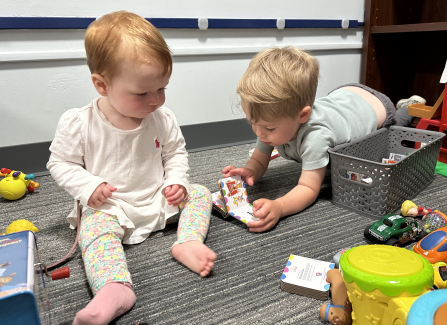
Lyla and Charles, courtesy of Katie.
Please get in touch with Dr. Federica Bulgarelli at fbulgare@buffalo.edu
Interested in participating in research?
The Narrative Lab wants to help make planning for end-of-life care (“advance care planning”) easier, more pleasant, and more dignified. We invite you to participate in our research by taking an anonymous survey about your own end-of-life healthcare preferences and beliefs. Your participation may contribute to improving advance care planning and may spark important conversations in your own life.
U.S. residents age 50+ (or 18+ for those with life-limiting illnesses) may be eligible to participate. We hope to have a wide diversity of participants complete the survey—please contribute your unique perspectives and feel free to pass this opportunity on to others!
Interested? The survey is available at tinyurl.com/EOLHealthSurvey. Questions? Contact Dr. Hollen Reischer at (716) 645-3957 or email hollen@buffalo.edu.
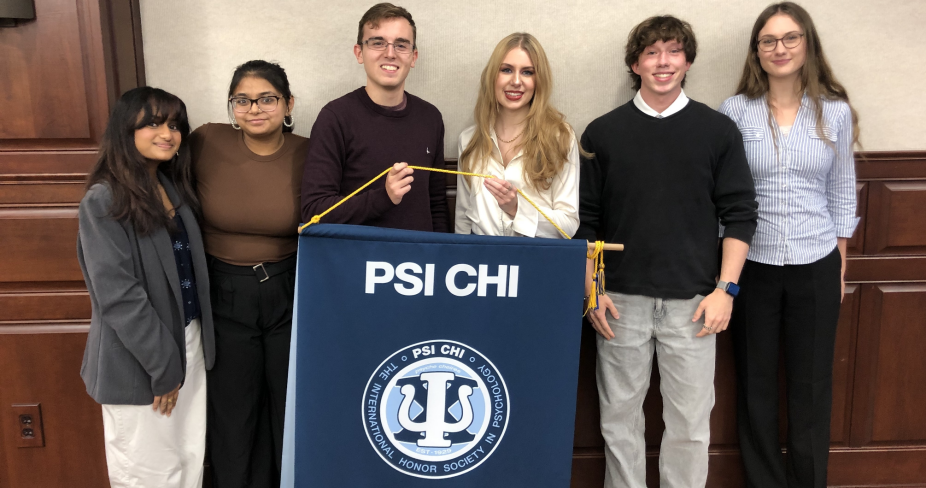
Psi Chi officers at the 2023 Fall Induction Ceremony. From left to right, Trishani Sudanandan (Secretary), Khushi Parashar (Social Media Voice / Graphic Designer), Reilly Diemond (Vice President), Jessica Gurbacki (President), Rowan Radel (Program Coordinator), and Alexis Dimitroff (Membership Coordinator).
Psi Chi
The UB chapter of Psi Chi, the International Honor Society in Psychology, was awarded a Model Chapter Award again for the 2023-24 academic year! This is the fourth year in a row that we have been recognized as a model chapter. With over 1,150 chapters globally, we were one of only 43 chapters to achieve the Model Chapter status this year.
This year, our student officers were as busy as always. They organized the semesterly research assistant fair, a graduate student panel, a board game night, a thrift clothing event, and an end-of-the-semester destress event. If you would like to find out more about our events, look for us in Psi Chi Headquarters’ “Eye on Psi Chi” digital magazine.
The chapter hosted the 5th annual Western New York (WNY) Undergraduate Psychology Conference last spring. We cannot believe that it has been five years since we first founded this conference! This was our largest conference yet, attracting over 150 attendees.
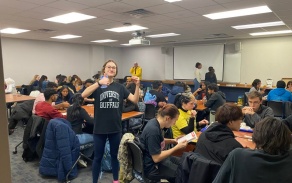
Psi Chi Officer Alexis Dimitroff is giving a thumbs up at a crowded board game night!
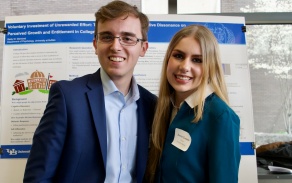
University at Buffalo Psi Chi President, Jessica Gurbacki (right), and Vice President, Reilly Diemond (left), at the 5th annual Western New York Undergraduate Psychology Conference.
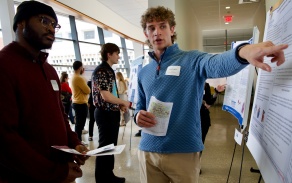
Canisius College student Kyle English presents his poster at the 5th annual Western New York Undergraduate Psychology Conference.
Our Recent Honorees
The generous gifts of alumni and department friends allow us to honor the scholarly contributions of our accomplished undergraduate and graduate students.
Katie Paige is the 2024 recipient of the Bugelski Dissertation Award. The $2000 monetary award honors excellence in scholarly productivity during doctoral studies and the significance and quality of the doctoral dissertation project. Katie received this award for her dissertation research on the effect of alcohol use on the development of executive functioning in adolescence. This award is supported by an endowment in the honor of Dr. B. R. Bugelski, a UB Distinguished Professor of Psychology and Chair of our department in the 1960s. Dr. Bugelski was best known for the advancement of the concept of "secondary reinforcement," an idea that has become a core concept in learning theory and appears in many psychology textbooks.
Verenice Ascencio Gutierrez is the 2024 recipient of the Robert W. Rice Memorial Award for Early Excellence in Research. Dr. Rice joined the UB Psychology department in 1976 and furthered his research examining quality of work and family life. The $1800 monetary award in his name honors distinguished early career research contributions by a junior graduate student. Verenice received this award for her 2024 paper, titled “TRPM4 and PLCβ3 Contribute to Normal Behavioral Responses to an Array of Sweeteners and Carbohydrates but PLCβ3 is Not Needed for Taste-Driven Licking for Glucose,,” published in "Chemical Studies."
Matthew Preisigke is the 2024 recipient of the Feldman-Cohen Award. Named in honor of two distinguished former faculty, the $500 monetary award is given to the undergraduate whose Honors Thesis receives the highest ranking by the student’s examination committee, faculty advisor, and the Director of the Honors Program. Matthew’s thesis investigated the effects of the anti-diabetic and weight loss medication liraglutide on healthy reinforcement processes in Long-Evans rats.
Hope White and Reilly Diemond are the 2024 graduate and undergraduate recipients of the Murray Levine Award for Community Engagement in Psychology. Dr. Murray Levine was a SUNY Distinguished Service Professor and a member of the UB Psychology Department from 1968 until 2000. Murray was among a core group of influential psychologists who helped launch the field of community psychology. This award recognizes original research poised to make a significant impact on the community surrounding UB and is sponsored by the generous support of Dr. Robert Fink, a UB alumnus and one of Murray’s former students.
Hope White was honored for her paper titled, “Play with Me: Effects of a Shared Activities Parenting Intervention on Positive Parenting and Relative Reinforcing Value of Food?”. Hope and her colleagues developed a home-based intervention to promote positive parenting skills and reduce childhood obesity in the Buffalo community.
Reilly Diemond was honored for his countless hours of service to the UB community. He has served in leadership roles in Psi Chi International Honors Society in Psychology, helped implement the yearly WNY Psychology Research Conference, assisted with recruiting undergraduates to the major, worked as a research assistant in the Seery, Simms, and Hawk labs, participated in many activities with the UB Women's Healthcare and Wellness Association, and finally, even served as an instructor for the College of Arts and Sciences Peer-Assisted Learning program
Thank you for your support of the Department of Psychology. With the support of alumni and friends, we can provide vital resources to enhance our department and provide support for students, research projects and programs. We are grateful for your generosity.
You can support your department and help to provide for our students by making a gift online.
